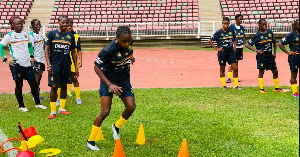Hurrah! Hurrah! Cameroon has won the bid to host the African Cup of Nations, AFCON, in 2019, 42 years after its on-the-field national disappointment and off-the-field financial scandal. The euphoria is on and I am no joykiller but let us, at least, pause for a moment.
In 2004, I wrote a political treatise captioned “Cameroon’s Democratic Process-Vision 2020,” in which among, other democratic development entitlements, I said; “Cameroon’s democracy is like its football; much ado about victories, little to show in infrastructure. Democracy without development is as useless as winning football trophies without football stadia”.
I started watching competitive football in the late 60s in Primary School Victoria cheering POWERCAM Hotspur each time they clashed with any of the other mighty warriors who transformed football from mere physical exercise to full artistic entertainment.
It was with the same passion that I watched PWD Bamenda, as a student of Sacred Heart College Mankon in the 70s, until my university days in the early 80s when most Cameroonian football lovers would congregate in every football stadium like worshippers seeking for healing and deliverance in one of these “covered-with-the-blood-of-Jesus” temples today.
Thirty years after, I still hold the membership card and yellow/white muffler of PWD Kumba - my darling team in the mid 80s.
So, I am no stranger to football dynamics, nor am I less a patriot for considering our present successful bid to host AFCON 2019 a misplaced development priority which is at variance with our stipulated and constitutional development trajectory.
I argued in my political treatise that multipartyism had failed in Cameroon, not necessarily because multiparty politics has proven to be a problematic model in Africa, but, primarily, because the political elite in Cameroon had been unable to provide a vision of a future for Cameroonians and a realistic strategy for achieving it.
In 2009 the Ministry of Economy, Planning and Regional Development published Cameroon’s Growth and Employment Strategy Paper, dubbed “Cameroon 2035”- an effort I hailed in another write-up titled “Rebranding Cameroon,” which title has turned out to be the title cover of my new book.
I cautioned, however, that such a great document required maximum national support, massive broad-based participatory input, and an affirmative, sensitive and receptive leadership. I concluded that Vision 2035 must be interpreted as a long term democratic and development agenda that is deeply rooted in yesterday’s compromise, today’s contradictions and tomorrow’s consensus.
I have read the 65-page Cameroon 2035 meticulously and still believe it is, indeed, a roadmap any government with political will could pursue given the 15 main pillars on which it is built. For those who are not very familiar with this document, let me paraphrase and quote some of its content.
Cameroon Vision 2035 has four general objectives, to wit: reduce poverty to socially acceptable levels; become a middle-income country; become a newly industrialised country and strengthen national unity and consolidate the democratic process. These objectives are to be attained through three steps covering the first 10-year period (2010-2019).
In other words, Cameroon, by 2020, is expected to implement a Growth Strategy, an Employment Strategy and a Strategy for Governance and Strategic management of the State.
Under these three main strategies, one finds development activities and outcomes on key economic areas like modernising the production system (increase in agricultural, animal, fisheries and forest product; exploitation and transformation of mine deposits, doubling the number of foreign tourists, among others); funding of the economy (taxation, banking system,microfinance,strengthening and mobilisation of national savings, debt strategy and so on); increasing decent employment opportunities (wage earning, self-employment from labour intensive initiatives and so on) improving efficiency of the job market (transparency of the job market among others) Governance and the rule of Law, greater visibility and clarity in State management, a monitoring and evaluation programme, just to name these few.
But the key economic area that has retained my attention is Development of Infrastructure.
Here, Cameroon is expected by 2020 to double the portion of tarred road network, create new ports and railway infrastructure, coming along with growth bearing priority projects; doubling of power consumption, construction of low-cost houses, raise access rate to potable water to 75 percent, raise access rate to sanitation infrastructure from 15 percent, to more than 60 percent and chart a national land map along with a council land map.
Just six years away from 2020; where are we? Let me restrict myself to the South West Region. Two days before this write-up, my wife travelled to Nyassoso (Kupe Mwanenguba Division) to condole with her friend who was burying her two sisters on the same day.
My wife went through the ordeal of mounting motorbikes between Loum and Nyassoso via Tombel, since the Kumba –Tombel Road has become a traveller’s nightmare.
In fact, she and her fellow mourners had to spend the night in Loum because the Loum-Tombel Road had virtually collapsed under the weight of heavy rains in tandem with soil erosion.
Yet the Loum-Tombel-Kumba-Mundemba-Akwa Road was supposed to have been a priority project during the 50th anniversary Reunification Jubilee. On the eve of my writing this essay, Cameroon State Television showed pictures of the Kumba-Mamfe muddy and bumpy road with heavy four-wheeled lorries somersaulting against each other like Chinese acrobats.
Only a few weeks ago, CRTV also, in its 7.30pm prime time news, showed the decay that was already gripping the Tiko Airport which was the arrival point of President Biya and his entourage during the Reunification Jubilee celebrations in Buea.
In the morning of my writing this piece, Mayor Patrick Aboko of Kombo Abedimo (Bakassi) was calling through Radio Buea on Government to make the Kumba-Mundemba-Akwa Road all-season.
This is only a microcosm of the development deficit, whether in the areas of basic farm-to-market roads, potable water, domestic airports, railway, energy and corporations that beset the people of Southwest in particular and the conflict-proof people of Cameroon in general.
My first argument is that nowhere in Vision 2035 have I seen the “construction of seven more stadiums and renovation of eight existing ones” as a short term (2010-2020) project.
This means priority would have been laid on the projects that have been identified in the short term and only after their completion can we bid to host AFCON say in 2023. And since we love celebrating anniversaries, 2023 would have coincided with the Golden Jubilee plus one since we hosted the last AFCON in 1972.
Those who argue that AFCON 2019 shall generate employment should convince me how the Chinese, with their local human devaluation mentality, shall accommodate Cameroonians in constructing some of the stadia.
Those who argue that AFCON 2019 shall boost tourism should educate me how many Africans have the purchasing power to cross borders just to cheer their national team when television is in their bedrooms, visa problems are perennial and transborder transport and security inadequacies stare them in their faces.
Logically, stadia would be empty when the host country is not playing, except the gates are flung open for free with a toll on State budget. Those who argue that AFCON 2019 shall improve internal transport facilities should explain how the four AFCON 2019 towns Bafoussam , Douala, Garoua and Yaounde, with none from West of the Mungo, shall benefit from a facelift transport network, compared to the needs on a national scale.
The rush, therefore, to host AFCON in 2019, may compromise the endogenous development strategy in Vision 2035 that would have benefitted more than 80 percent of the population by 2020.
My second argument is that we did not have to precipitate hosting AFCON because we want to “raise the competition level of our national football team” when it is clear that 95 percent of the team is made up of those playing out of the country.
Neither would post-AFCON 2019 attract football lovers to our stadia as it was in the years of yore when Prisons Buea would play against Oryx Douala, Ouragan Loum against Aigle Nkongsamba, PWD Bamenda against Dynamo or Canon Yaounde against Kohi Maroua.
The problem with our local football competition, even if it goes professional, is simply that of a pathological lack of patriotic and altruistic management personnel. And this is where I disagree with President Barack Obama when he declares that Africa needs strong institutions not strong individuals. We need both.
Hoping that the impending elections in FECAFOOT shall usher a new mindset and corporations would be interested in making our football professional, it would have been better to start this year and sustain that momentum for at least 10 years within which corporate resources and spectators’ fees as well as FIFA support would give our sports infrastructure the needed facelift.
Otherwise, without an internal robust professional football commitment, the beautiful AFCON 2019 stadiums may relapse into patrimonies of underused or abandoned memories.
My last argument is that we did not need to bid for AFCON 2019 as if our nation had a point to prove to the world by running a race against relatively less famous football nations who were used as sparring partners. We are a football people and a football nation with the game fast becoming our diplomatic vista to the world and political firefighter to the country.
This was, therefore, the time to judiciously pursue our well drafted development paper, especially as the genuine measurement and indicator of development is how it resonates on the greater number of the population. Development is from within and bottom-up, it is pro-people and it is the only factor that matters in human development index.
We know how countries have faced an economic downtrend simply because they focused on prestige rather than sustainable projects; isolated development success rather collective development infrastructure; and inverted pyramid economic decisions rather than grassroots development priorities.
As I was ending this article, I saw a sound bite in one of this morning’s newspapers “Le Messager” on a TV Press Review quoting Eric Chinje as saying that “Cameroon shall not realise its Vision 2035”. Let me end here so I can go buy a copy of the paper to find out if Chinje’s declaration has been influenced by AFCON 2019.
Opinions of Monday, 29 September 2014
Auteur: Mwalimu George Ngwane














